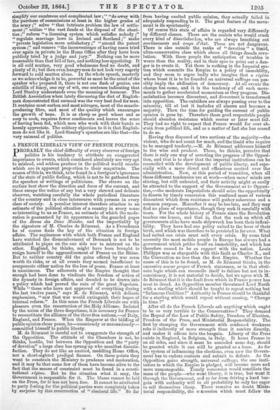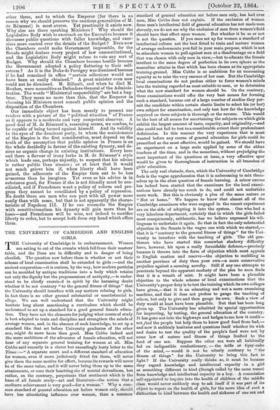A FRENCH LIBERAL'S VIEW OF FRENCH POLITICS. P ROB&BLY the chief
difficulty of every observer of foreign politics is his tendency to attribute an exaggerated importance to events, which considered absolutely are -very apt to mislead, and seldom produce in the political world results which are in apparent proportion to their magnitude. The reason of this is, we think, to be found in a foreigner's ignorance of the state of public feeling, which is not to be gathered from the speeches or writings of politicians. The straws on the surface best show the direction and force of the current, and these escape the notice of any but a very shrewd and delicate observer, watching carefully the whole periodical literature of the country and in close intercourse with persons in every class of society. A peculiar interest therefore attaches to an estimate of the political situation of a country in every sense so interesting to us as France, an estimate of which the mode- ration is guaranteed by its appearance in the guarded pages of the Revue des Dear Mondes, and the impartiality by the signature of M. Charles de Rerausat. Is a Frenchman he of course finds the key of the situation in foreign affairs. The supineness with which both France and England have watched the dismemberment of Denmark is not to be attributed to pique on the one side nor to mistrust on the other. England, he thinks, might have been brought to resign herself to the aggrandizement of France on the Rhine. But to neither country did the gains offered by war seem worth its risks, or at all events they seemed insufficient to compensate either nation for the loss of peace. France at least is unanimous. The adherents of the Empire thought that enough had been done to vindicate the freedom of action of the dynasty in foreign affairs, and dreaded to be drawn into a policy which had proved the ruin of the great Napoleon. While "those who have not approved of everything during the last twelve years," says M. de Remnant, with delicate euphemism, "saw that war would extinguish their hopes of internal reform." In this sense the French Liberals see with pleasure even the resurrection of the Holy Alliance. Isolated by the union of the three despotisms, it is necessary for France to reconstitute the alliance of the three free nations,—of Italy, England, and France. When the Emperor at the bidding of public opinion chose peace, he—consciously or unconsciously— committed himself to public liberty. M. de Remusat is careful not to exaggerate the strength of the Opposition. The attitude of the Chambers is not, he thinks, hostile, but between the Opposition and the "party of devotion" a large class has sprung up who manifest dissatis- faction. They do not like an excited, meddling Home Office, nor a short-sighted prodigal finance. On these points they want to constrain the Ministry to prudence and moderation, and it may be that some few of them have become alive to the fact that the means of constraint must be found in a consti- tutional regime. But be the situation what it may, the Government is responsible for it. The blame cannot be laid on the Press, for it has not been free. It cannot be attributed to party feeling for the political parties were completely taken by surprise by this resurrection of "electoral life." So far from having excited public opinion, they actually failed in adequately responding to it. The great feature of the move- ment is its spontaneity. Of course this state of affairs is regarded very differently by different classes. There are the zealots who would crush every kind of dissatisfaction, who are always breathing out avertissements and coups d'ertat. These are not dangerous. There is also outside the ranks of " devotion " a timid, ultra-conservative class which above all things dreads revo- lution. With these people the anticipation of troubles is worse than the reality, and in their eyes to point out a dan- ger is to create it. Yet there is nothing in the Imperial sys- tem which commits the Empire to a policy of immobility, and they seem to argue badly who imagine that a regime whose boast it is to be founded on universal suffrage can pos- sibly imply the abdication of democracy. At all events the change has come, and it is the tendency of all such move- ments to gather accelerated momentum as they progress. Dis- satisfaction becomes discontent, and discontent is transformed into opposition. The outsiders are always passing over to the minority, till at last it includes all classes and becomes a majority. Then the time for guiding the current of public opinion is gone by. Therefore these good respectable people should abandon resistance which sooner or later must fail. They had no right to expect that France would for ever ab- stain from political life, and as a matter of fact she has ceased to do so.
Having thus disposed of two sections of the majority—the violent, who do not count for much, and the timid who require to be managed tenderly,—M. de Remusat addresses himself to the wise and prudent. These, he thinks, perceive that there is only one way of arresting the progress of the Opposi- tion, and that is to show that the imperial institutions can be reconciled with the development of public liberty, and espe- cially with a more direct and efficacious control over the administration. Now, at this period of transition, when all these different tendencies-are at work—when mons' minds are stirring, but still unheated, and their activity might as easily be attracted to the support of the Government as to Opposi- tion,—the moderate Imperialists should seize the opportunity to disarm by timely concession this confused mass of various discontent which from resistance will gather coherence and a common purpose. Hereafter it may be too late, and they may find no place of repentance, though they seek it carefully with tears. For the whole history of France since the Revolution teaches one lesson, and that is, that the rook on which all governments alike have made shipwreck has been their inflexi- bility. They have had one policy suited to the hour of their birth, and which was therefore to be persisted in for ever. What had suited one crisis must suit every crisis. By some fatal necessity the most mobile people in Europe has always had a government which prides itself on immobility, and which has therefore ceased to be en rapport with the nation. Louis Philippe was as chargeable with this fault as Charles X., and the Convention no less than the first Empire. Whether the cause of this is to be found, as M. de Remusat thinks', in the excessive amour propre of French statesmen, or in that obsti- nate logic which can reconcile itself to failure but not to in- consistency, it is not material to decide, but we agree with M. de Remusat that it is the fault from which in France power has most to dread. An Opposition member threatened Lord North with a starling which should be taught to repeat nothing but "Infamous Coalition I" Authority in France should be thankful for a starling which would repeat without ceasing, "Change in time !"
After all do the French Liberals ask anything which ought to be so very terrible to the Conservatives? They demand the Repeal of the Law of Public Safety, Freedom of Election, Freedom of the Press, and Ministerial Responsibility. The first by stamping the Government with confessed weakness robs it indirectly of more strength than it confers directly, and makes it odious into the bargain. Liberty of the Press exists in England, in Belgium, in Italy. It hems France in on all sides, and since it must be conceded some day, should be granted while it can still be granted as a boon. As for the system of influencing the elections, even now the Govern- ment has to endure contests and submit to defeats. As the Opposition gains strength, universal suffrage, the one insti- tution to which the Empire is pledged, will become more and more unmanageable. Timely concession would conciliate the mass of the people—who want liberty, it is true, but want it through the Government, and so far from driving a hard bar- gain with authority will in all probability be only too eager to sell themselves cheap. There remains no doubt Minis- terial responsibility, the cc neession which must follow the
other three, and to which the Emperor (for there is no reason why we should preserve the cautious generalities of M. de Remusat) is most averse. Yet practically it exists now. Why else are there speaking Ministers ? Why should the Legislative Body wish to encroach on the Executive because it discusses public questions with fuller knowledge, and exer- cises more control over the details of the Budget ? Even now the Chambers could make Government impossible, for the Senate might declare every project of law unconstitutional, and the Legislative Body might refuse to vote any sort of Budget. Why should the Chambers become hostile because the Government adopted a policy flattering to their self- esteem ? As it is the Duke de Persigny was dismissed because if he had remained in office "certain adhesions would not have been as easily obtained." A great minister even now could not be dismissed. M. Billault, and when he died M. Rouher, were necessities as Defenders-General of the Adminis- tration. The words "Ministerial responsibility" are but a bug- bear. They mean no more than this, that the Emperor in choosing his Ministers must consult public opinion and the disposition of the Chambers.
Our immediate object has been merely to present our readers with a picture of the "political situation " of France as it appears to a moderate and very competent observer. A good deal of M. de Remusat's, reasoning seems, we confess, to be capable of being turned against himself. And its validity in the eyes of the dominant party, to whom the maintenance of the ]mpire is the first consideration, must depend on the truth of the assumption that public opinion in France is on the whole decidedly in favour of the existing dynasty, and de- sires no organic change in existing institutions. Every here and there a flavour of irony lurks in M. de Remusat's style which leads one, perhaps unjustly, to suspect that his advice is rather politic than sincere ; or at least that it would not much grieve him if, when liberty shall have been gained, the adherents of the Empire turn out to be less namerous than he imagines. Yet even so his advice is in substance good, for France if she is not friendly must be con- ciliated, and if Frenchmen want a policy of reform and pro- gress they cannot be conciliated by a policy of repression. No doubt there are men who can part with all power more easily than with some, but that is not apparently the charac- teristic of Napoleon III. If he can reconcile the Empire with constitutionalism his dynasty will gain more than he loses—and Frenchmen will be wise, not indeed to sacrifice liberty to order, but to accept both from any hand which offers them.































 Previous page
Previous page